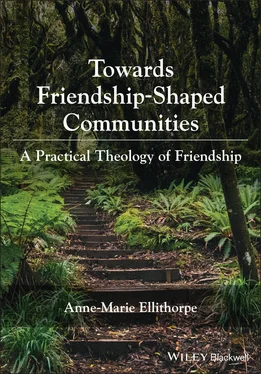I am aware that any proposed practical theology of friendship must reckon with the social imagination(s) operative in its contexts that perpetuate fear of and discrimination against the other and that hinder the cultivation of personal and civic friendship within communities of practice. My focus within this work is primarily on developing a transformative ideal to be worked towards. I acknowledge there are very real challenges in pursuing personal and public ideals.
I engage diverse voices as I seek to develop a rich and thick theological understanding of friendship. At times breadth is privileged over depth. This breadth is not inappropriate, given that the social imagination is formed and informed by diverse voices and sources. In fact, a more thorough practical theology of friendship would include even greater diversity. While my research predominantly draws on Western sources, traditions, disciplines, and epistemologies, I also seek to weave in Indigenous perspectives.
This introductory chapter outlines the context for this research by providing an overview of practical theology, discussing understandings of the word practice , identifying the importance of the social and theological imagination, and outlining the methodology and structure of this research. But firstly, why would I want to study friendship? Why develop a practical theology of friendship?
As I write, with minimized social contact and physical distancing requirements in place throughout much of the world as we collaboratively seek to protect our communities during a pandemic, our human need for connectivity and friendship has become all too evident. In early April 2020, after our first few weeks of “lockdown,” my ten-year-old son, an avid reader, protested to me that “books and videos are poor substitutes for friends.” I agreed with him. While adults have been able to maintain relationships and even forge new friendships through online forms of connectivity, some relationships have become stressed or neglected due to dependence on technology. Younger and older generations are discovering anew a need for the physical presence of others. Despite the emotional cost of isolation, friendship as a basic human need is not consistently recognized. For example, during the second lockdown in Victoria, Australia, an exemption to lockdown could be made for an “intimate relationship,” but for those who lived alone without such a relationship, no similar exemption was allowed for friendship. 6 This restriction was subsequently modified to allow for visits with one “bubble” friend, though not without controversy. In Canada also, friendships have been vulnerable to “the divisive vagueness of provincial guidelines,” with some health messaging suggesting that, at least as far as the state is concerned, friendships are not important. 7
The widespread need for social and civic friendship has also become all too evident as the pandemic has disproportionally impacted People of Color and been further highlighted by the violent deaths of People of Color due to the discrimination of police officers and other citizens in the United States and Canada. Ongoing deaths and injuries have highlighted systemic racism and provoked widespread protests. Long-standing systemic and social inequities have put many people from marginalized groups at increased risk of contracting and dying from Covid-19. 8
Covid-19 has highlighted the interdependence of human beings. While an initial sense of solidarity has, in some contexts, been challenged by political polarization and conspiracy theories, numerous memes and posts on social media express a need and desire to create a truly new normal after Covid-19, rather than to return to the way things were. Collectively, we are faced with both the opportunity and the need to rethink our ways of life. It is into this context that I advocate the metaphor of friendship and the concept of civic friendship to shape our social imagination and the new normal that many of us long for.
My interest in the formal study of friendship began over a decade ago, through an interest in the relationships of spiritual friendship and spiritual direction, with their focus on attentiveness to God, self, and other. I wondered about the possibility of bringing that same level of attentiveness to our everyday friendships, as I recognized the potential for these friendships also to be shaped by the Spirit. I subsequently became intrigued by the Māori concept of whanaungatanga (kin and kin-like relationships), the classical notion of civic friendship, and the potential for both concepts to contribute to fostering a pervasive culture of friendship. Admittedly, I initially skimmed over Aristotle’s terminology of political friendship , incorrectly assuming such a relationship was about using people. On further reading I became captivated by a broader understanding of friendship. As I dug deeper into biblical texts, I was intrigued by the manifest desire for communities to be shaped by friendship-like relationships expressed in texts more ancient than Aristotle’s. The need for communities to be shaped by care and concern for all is increasingly evident as we collaboratively seek to survive a pandemic. A concern for communities to be shaped by social friendship has been affirmed by Pope Francis in his encyclical Fratelli tutti , released in October 2020.
While Western paradigms of relationality have occupied recent scholarship regarding friendship, contemporary Euro-Western culture is largely indifferent to the formative potential of friendship, and has much to learn from Indigenous, classical, biblical, and historical understandings of friendship, kinship, and right-relatedness. Friendship has been devalued, sidelined, trivialized, sentimentalized, and sometimes eroticized within contemporary Euro-Western culture. Currently, friendships tend to be perceived as recreational relationships.
In classical times, however, friendship was considered a school of virtue and regarded as integral to living the best life possible. Friendly civic relations were recognized as necessary for the good and just society. Friendship was so central to moral philosophy that Aristotle devoted two books of his Nicomachean Ethics to this topic. In the ancient Hebrew texts relationships of mutuality and friendship are also an important concern. The language of reciprocity in the writings of prophets and reformers, including the condemnation of distorted reciprocity, indicates concern for what has elsewhere been described as civic friendship. Friendship was celebrated at diverse tables in the Jesus movement, leading to the accusation by outsiders that Jesus was a friend of disreputable groups. 9
Subsequently, a body of writing developed that interpreted Christian love as the love of friendship. This literature flourished in Western Europe between the ninth and twelfth centuries. Friendship lost its prominence within spiritual writings after about 1180. 10 It is likely that the twelfth century synthesis of classical and Christian perspectives contributed to monastic communities becoming a “garden of friends” whose existence transformed the world beyond their walls. 11 This season of synthesis was followed by a flight from friendship and its celebration.
In recent years there has been a modest renewal of scholarly attention to friendship among anthropologists, political scientists, sociologists, philosophers, and theologians. Various scholars have revisited and sought to recover the classical concept of “friends as fellow-citizens,” and of “fellow-citizens as friends.” 12 In theological spheres, new insights into friendship have emerged through the experience of solidarity in liberation struggles, from a variety of feminist theological writings, and from Trinitarian theologians. However, a comprehensive theology of friendship has not yet been developed and Christian communities have not responded adequately to contemporary cultural concerns regarding relationality.
Читать дальше












